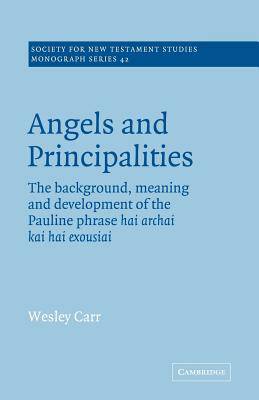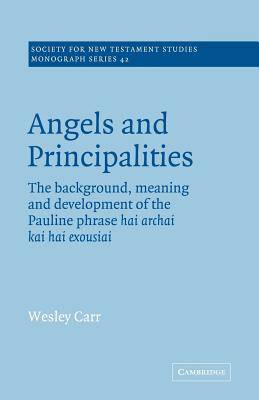
- Afhalen na 1 uur in een winkel met voorraad
- Gratis thuislevering in België vanaf € 30
- Ruim aanbod met 7 miljoen producten
- Afhalen na 1 uur in een winkel met voorraad
- Gratis thuislevering in België vanaf € 30
- Ruim aanbod met 7 miljoen producten
Zoeken
Angels and Principalities
The Background, Meaning and Development of the Pauline Phrase Hai Archai Kai Hai Exousiai
A Wesley Carr, Wesley Carr
€ 90,95
+ 181 punten
Omschrijving
St Paul and his contemporaries - so runs a commonly accepted scholarly opinion - inhabited a world believed to be dominated by hostile superhuman powers, of whom Jews and Gentiles alike liked in fear. Dr Carr challenges this widespread assumption by means of a detailed examination of various kinds of evidence. First there is the New Testament itself. The general Mediterranean cultural background of the first century is also important, and the author looks at evidence from the early Church Fathers and gnostic material. He concludes that the notion of mighty forces of evil ranged against man was not part of the earliest Christian understanding of the world and the gospel. His argument has special significance in the light of the belief that a present-day interpretation may be given to the idea of hostile powers and their conquest by Christ, thus supporting political, social and ethical thinking within the Christian Church.
Specificaties
Betrokkenen
- Auteur(s):
- Uitgeverij:
Inhoud
- Aantal bladzijden:
- 256
- Taal:
- Engels
- Reeks:
- Reeksnummer:
- nr. 42
Eigenschappen
- Productcode (EAN):
- 9780521018753
- Verschijningsdatum:
- 22/08/2005
- Uitvoering:
- Paperback
- Formaat:
- Trade paperback (VS)
- Afmetingen:
- 140 mm x 216 mm
- Gewicht:
- 326 g

Alleen bij Standaard Boekhandel
+ 181 punten op je klantenkaart van Standaard Boekhandel
Beoordelingen
We publiceren alleen reviews die voldoen aan de voorwaarden voor reviews. Bekijk onze voorwaarden voor reviews.











